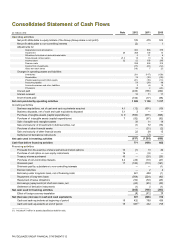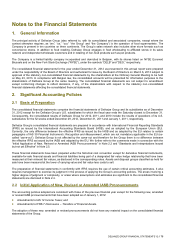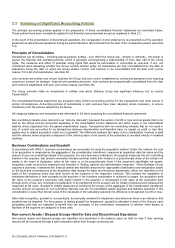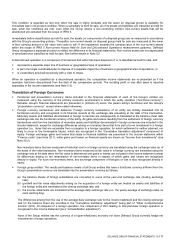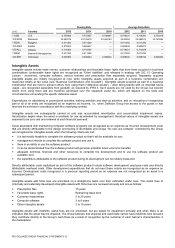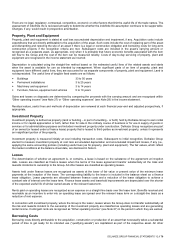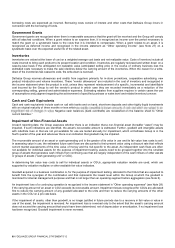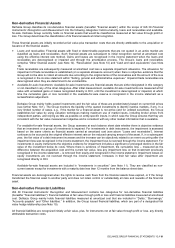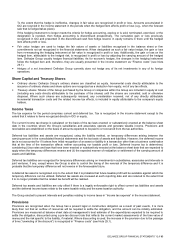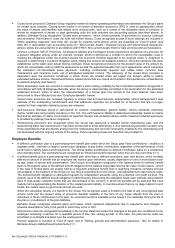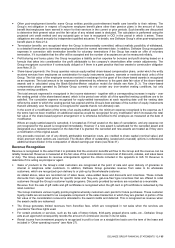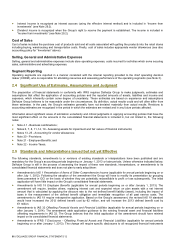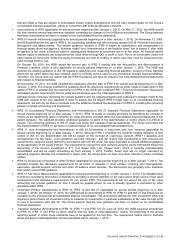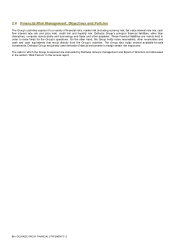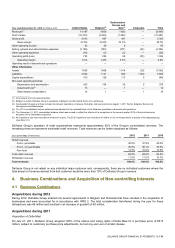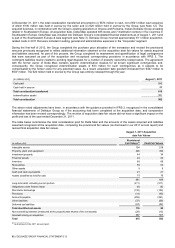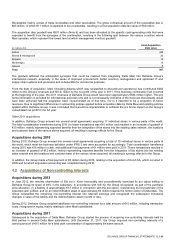Food Lion 2012 Annual Report Download - page 86
Download and view the complete annual report
Please find page 86 of the 2012 Food Lion annual report below. You can navigate through the pages in the report by either clicking on the pages listed below, or by using the keyword search tool below to find specific information within the annual report.84 // DELHAIZE GROUP FINANCIAL STATEMENTS’12
Closed store provisions: Delhaize Group regularly reviews its stores operating performance and assesses the Group’s plans
for certain store closures. Closing stores results in a number of activities required by IFRS in order to appropriately reflect
the value of assets and liabilities and related store closing costs, such as a review of net realizable value of inventory or
review for impairment of assets or cash generating units (for both activities see accounting policies described above). In
addition, Delhaize Group recognizes “Closed store provisions,” which consist primarily of provisions for onerous contracts
and severance (“termination”) costs (for both see further below). Costs recognized as part of store closings are included in
“Other operating expenses” (see Note 28), except for inventory write-downs, which are classified as “Cost of sales” (see
Note 25). If appropriate (see accounting policy for “Non-Current Assets / Disposal Groups and Discontinued Operations”
above), stores are accounted for in accordance with IFRS 5 Non-current Assets Held for Sale and Discontinued Operations.
Onerous contracts: IAS 37 Provisions, Contingent Liabilities and Contingent Assets requires the recognition of a provision for
a present obligation arising under an onerous contract, which is defined as a contract in which the unavoidable costs of
meeting the obligations under the contract exceed the economic benefits expected to be received under it. Judgment is
required in determining if a present obligation exists, taking into account all available evidence. Once the existence has been
established, at the latest upon actual closing, Delhaize Group recognizes provisions for the present value of the amount by
which the unavoidable costs to fulfill the agreements exceed the expected benefits from such agreements, which comprises
the estimated non-cancellable lease payments, including contractually required real estate taxes, common area
maintenance and insurance costs, net of anticipated subtenant income. The adequacy of the closed store provision is
dependent upon the economic conditions in which stores are located which will impact the Group’s ability to realize
estimated sublease income. Owned and finance leased stores that are closed and rented to third-parties are reclassified as
investment property (see Note 9).
When termination costs are incurred in connection with a store closing, a liability for the termination benefits is recognized in
accordance with IAS 19 Employee Benefits, when the Group is demonstrably committed to the termination for the estimated
settlement amount, which is when the implementation of a formal plan has started or the main features have been
announced to those affected (see also “Employee Benefits” below).
Closed store provisions are reviewed regularly to ensure that accrued amounts appropriately reflect management’s best
estimate of the outstanding commitments and that additional expenses are provided for or amounts that are no longer
needed for their originally intended purpose are released.
Self-insurance: Delhaize Group is self-insured for workers’ compensation, general liability, vehicle accidents, pharmacy
claims, health care and property insurance in the U.S. The self-insurance liability is determined actuarially, based on claims
filed and an estimate of claims incurred but not reported. Excess loss protection above certain maximum retained exposures
is provided by external insurance companies.
Restructuring provisions are recognized when the Group has approved a detailed formal restructuring plan, and the
restructuring either has commenced or has been announced to those affected by it. Any restructuring provision contains only
those expenditures that are directly arising from the restructuring and are both necessarily entailed by the restructuring and
not associated with the ongoing activity of the Group. Future operating losses are therefore not provided for.
Employee Benefits
A defined contribution plan is a post-employment benefit plan under which the Group pays fixed contributions - usually to a
separate entity - and has no legal or constructive obligation to pay further contributions regardless of the performance of the
funds held to satisfy future benefit payments. The Group makes contributions to defined contribution plans on a contractual
and voluntary basis. The contributions are recognized as “Employee benefit expense” when they are due (see Note 21.1).
A defined benefit plan is a post-employment benefit plan other than a defined contribution plan (see above), which normally
defines an amount of benefit that an employee will receive upon retirement, usually dependent on one or more factors such
as age, years of service and compensation. The Group’s net obligation recognized in the balance sheet for defined benefit
plans is the present value of the defined benefit obligation at the balance sheet date less the fair value of plan assets - which
in the case of funded plans are usually held by a long-term employee benefit fund or qualifying insurance company and are
not available to the creditors of the Group nor can they be paid directly to the Group - and adjustments for past service costs.
The defined benefit obligation is calculated regularly by independent actuaries using the projected unit credit method. The
present value of the defined benefit obligation is determined by discounting the estimated future cash outflows using interest
rates of high-quality corporate bonds that are denominated in the currency in which the benefits will be paid and that have
maturity terms approximating the duration of the related pension liability. In countries where there is no deep market in such
bonds, the market rates on government bonds are used.
When the calculation results in a benefit to the Group, the recognized asset is limited to the total of any unrecognized past
service costs and the present value of economic benefits available in the form of any future refunds from the plan or
reductions in future contributions to the plan. An economic benefit is available to the Group if it is realizable during the life of
the plan or on settlement of the plan liabilities.
Delhaize Group recognizes actuarial gains and losses, which represent adjustments due to experience and changes in
actuarial assumptions, fully in the period in which they occur in OCI.
Past service costs are recognized immediately in the income statement unless the changes to the plan are conditional on the
employee remaining in service for a specified period of time (the vesting period). In this case, the past service costs are
amortized on a straight-line basis over the vesting period.
Pension expense is included in “Cost of sales” and in “Selling, general and administrative expenses.” See for details of
Delhaize Group’s defined benefit plans Note 21.1.


